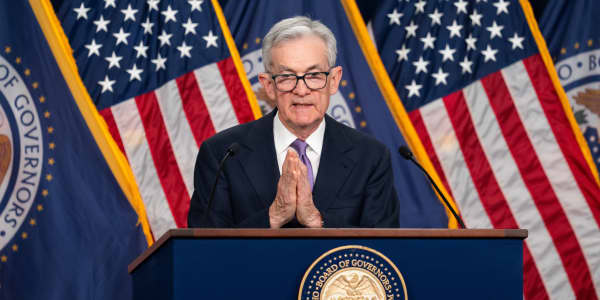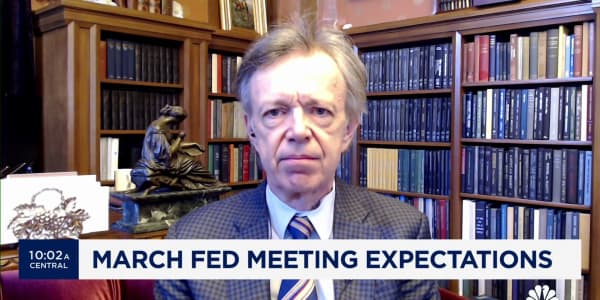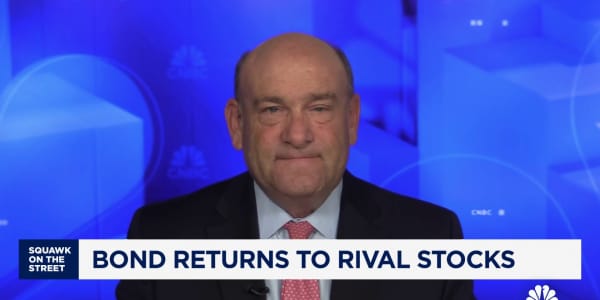The Federal Reserve will stay on course with its easy monetary policies for at least the rest of this year, despite the looming threats of higher prices and a tightening labor market, according to the latest CNBC Fed Survey.
As in previous surveys, respondents forecast the first major change the Fed will make to monetary policy will be to reduce its $120 billion in monthly asset purchases, projecting a tapering announcement in October 2021 and the reduction to begin in January 2022, the same month predicted in CNBC's April survey.
However, survey respondents predicted the first rate hike would happen in November 2022, one month earlier than the previous survey's forecast, and for the first time since December 2018, one respondent predicted an interest rate hike at this FOMC meeting.
Of the 35 respondents, 86% say the current level of asset purchases are not needed to help the market function – a major increase from the 68% who answered the same way in the April survey. Even more respondents – 89% — say the asset purchases are not needed to help the economy, up from 65 percent in April. When asked about inflation, 63% say the risk to the economy is high enough that the Federal Reserve should reduce purchases now.
"Basic economics argues strongly that the U.S. is hobbled by the responsiveness of the supply curve of both products and labor and not from a deficiency in demand," wrote John Ryding, chief economic advisor at Brean Capital. "Monetary policy should be pivoting to address the risk of rising inflation and not be operating in a backward-looking framework."
"Inflation will accelerate faster and prove to be more persistent than the Fed expects but will not substantially alter their timetable for unwinding QE or hiking interest rates," said Mark Vitner, senior economist at Wells Fargo Corporate Investment Bank.
Troubling, but temporary
Inflation rose to the top of the list of potential threats to the U.S. economy, overtaking the coronavirus pandemic by a solid margin. At the same time, 60% of respondents saw the increase in prices as temporary, versus 29% who viewed it as permanent.
The average forecast for 2021 year-over-year CPI was 3.88%, a sharp increase from 2.76% in the previous survey. On average, respondents believed CPI would peak at 5.3% in November 2021.
"The Fed is making a hedged bet. It has more tools to deal with an overshoot on inflation than an undershoot on employment and we have undershot employment for too long," wrote Diane Swonk, chief economist at Grant Thornton.
Fears of COVID-19's impact on the economy diminished further, as 94% of respondents said the U.S. recession was over. Survey takers were more split on whether the pandemic itself was over, with 43% saying the pandemic has ended vs. 40% who said it has not.
Survey respondents expect the economy to grow more than 6.4% this year, down slightly from the previous surveys forecast of over 6.5%. The unemployment rate is forecast to decline to 4.9% this year, and the average forecast was for the U.S. economy to be fully restored to pre-pandemic levels by the fourth quarter of the current year.
Respondents see the S&P 500 hitting 4,285 by year-end and topping 4,468 by the end of 2022. The benchmark was last trading at about 4,240. The 10-year yield (currently at about 1.5%) is forecast at 1.85% by the end of this year and increase above 2.3% next year.
69% of respondents view stocks as overvalued relative to their fundamental outlooks for economic and earnings growth.
The labor shortage was a growing concern for survey respondents, although 77% saw the struggle of businesses to find workers as a temporary problem. When asked what they saw as the factors most responsible for the tight hiring market, 63% said the high level of unemployment benefits, while 43% said child care concerns and 26% cited employers reluctance to pay higher wages.
Respondents, which include money managers, investment strategists and economists, were surveyed from June 10 to June 12.




